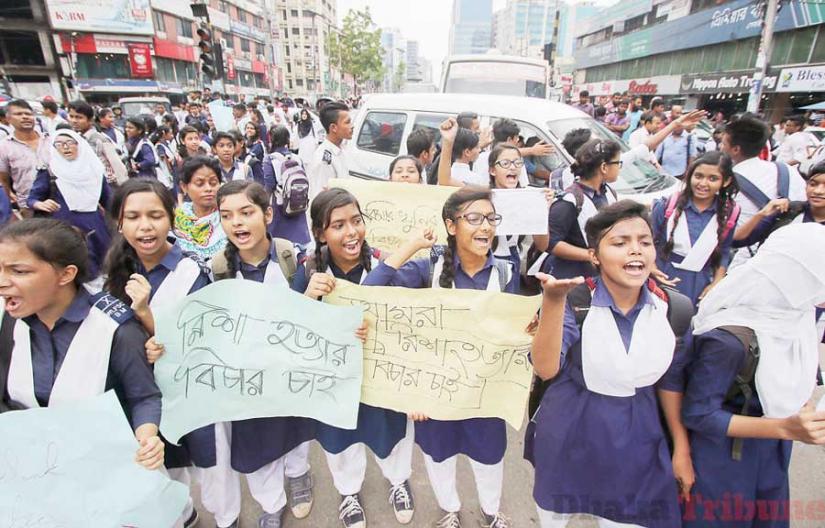 Rape is the most perverted expression of sexual abuse and from a feminist perspective it is the worst kind of illegal patriarchal practice. Unfortunately rape and sexual abuse of women is prevalent in every society, even in the most developed nations, in varying degrees and in different forms. The heinous incidents of rapes in Bangladesh, especially of children, happening since last couple of months have reinforced the public demand of seeking death penalty for the rapists believing that this would reduce the number of incidents. Now the question arises whether death penalty is actually an effective deterrent against rape or does toughening the punishment of a crime in reality will reduce its occurrence?
Rape is the most perverted expression of sexual abuse and from a feminist perspective it is the worst kind of illegal patriarchal practice. Unfortunately rape and sexual abuse of women is prevalent in every society, even in the most developed nations, in varying degrees and in different forms. The heinous incidents of rapes in Bangladesh, especially of children, happening since last couple of months have reinforced the public demand of seeking death penalty for the rapists believing that this would reduce the number of incidents. Now the question arises whether death penalty is actually an effective deterrent against rape or does toughening the punishment of a crime in reality will reduce its occurrence?
No study has ever pointed out that the death penalty can act as a deterrent to any crime. First of all seeking death penalty for a crime requires a very tight and complicated set of guidelines for its implementation which in turn poses lots of burden on the prosecution to follow, trials take longer to finish, resulting in delays and sometimes inaccuracies in judgment. Imposing the death penalty for rape crimes may actually deter the system from handing out conviction. When the punishment is severe it means that the accused may be released due to lack of sufficient evidence or witness or because there is no option for lesser punishment. Secondly a death penalty may lead to more post rape murders of the victims since leaving a victim alive after a rape would invite a greater risk of being caught and sentenced to death. Thirdly, if the penalty for rape is death more incident of under reporting of the crime might occur. Sometimes in crimes pertaining to sex abuse and rape the perpetrator is a close family member. Therefore the family tries to save the offender by not reporting the crime. Death penalty for rapes may lead to short term reduction of the number of rapes but it may prove ineffective in the long run. Preventing rape and sexual abuse is a multi task objective which requires an effective judiciary, efficient law enforcement agencies, implementation of laws, sensitization of the offenders and A progressive social movement etc.
Research shows that in rural areas of Bangladesh nearly 82 percent and in urban areas nearly 79 percent men cited entitlement as their reason for rape[1]. Approximately 61.2 percent urban men who raped did not feel guilty or worried afterwards and 95.1 percent rural men did not experience any legal consequence and less than 2 percent of women report rape or sexual abuse[2]. Reportedly at least 496 children were raped in last six months which means we have 82 victims of rape per month. This huge number of child rapes in only few months clearly indicates that something is severely wrong in our social system and we must do everything possible to prevent such heinous crimes.
First of all we have to ensure a social system where the victim and her family can fearlessly report such incidents and seek help from the legal system. The under reporting of rape is a common phenomenon in our country which means that even strict laws do not embolden victims and their families to report the crime. The social stigma attached to rape and its linkage with women’s chastity and honor of the family promotes a silence among the victim. Silence of the victim in turn encourages offenders to commit or repeat such crime; as such silence ensures the removal of the fear of punishments. Breaking the culture of silence about sexual abuse and rape through discussion and reporting must be encouraged at the family level. We have to create a social environment where victims and their families are not stigmatized rather the offenders are stigmatized.
Rape cases must be trialed promptly so that victims do not have to wait till an uncertain period to get justice and get frustrated or harassed further by the accused. The prevention of women and child repression act 2000 (amended in 2003) provides the provision for capital punishment in cases of death followed by rape. This Act mandates stringent punishment for rape and gang rape. The 2000 Act also contains provisions for speedy investigation (investigation should be completed in 60 days) and trial (trial to be completed in 180 days). Proper implementation of these provisions of the Act would make a huge difference. Considering the increased number of rapes more first track courts for speedy trial should be created. Accountability of the police and concerned medical officer has to be ensured. Coordination between the agencies has to be increased to provide full cooperation/protection to rape victims. It is also important to make sure during a rape hearing only the relevant people and officers stay in the court room. Since the charge sheet contains classified information about the rape incident which sometimes make the victim uncomfortable and vulnerable enough not to continue the legal proceeding. Section 155 of the Evidence Act of 1872 contains that in rape case the victim might be interrogated about her character and life style which leaves the room open for the accused to unduly prove the victim as of immoral character to get the verdict in his favor. This provision needs to be amended to encourage the victims to come forward for justice.
It is also important to make sure during a rape hearing only the relevant people and officers stay in the court room. Since the charge sheet contains classified information about the rape incident which sometimes make the victim uncomfortable and vulnerable enough not to continue the legal proceeding. Section 155 of the Evidence Act of 1872 contains that in rape case the victim might be interrogated about her character and life style which leaves the room open for the accused to unduly prove the victim as of immoral character to get the verdict in his favor. This provision needs to be amended to encourage the victims to come forward for justice.
Besides focusing on the judicial system we have to focus on reforming the gender identities and gender based discrimination that are socially constructed in our public and private lives. Progressive social movements need to be made to reform the masculine attitude towards women rather focusing on reforming women by limiting their freedom of movement or questioning their dress code and character. The culture of respecting women has to be ensured at the family level through treating both males and females with equal respect and practicing non discrimination.
Educating our children about sexual abuse in a manner which will make them conscious about the dangers they face without causing any psychological burden is very important. Provisions should be made in the text books about appropriate sexual behavior including consensual sex and basic sex education. In educational institutions and work places supportive environment for rape victims should be ensured.
Media, movie or book, author or any person that dehumanizes or degrades women by portraying them or calling them as object of sex must be banned since they contribute to the rape culture. The state must also take strong stand against the use of illegal drugs and abusive pornography which are other reasons behind rapes and sexual abuses. Persons convicted of rape or sexual abuse may be socially stigmatized but monitoring and sensitization of the accused/offender is important to ensure that they do not further commit such crime.
Recently the High Court of Bangladesh observed that moral degradation has reached such a point that rapes are happening repeatedly but to improve morality what could be done remains a question. We have to rethink about education, accountability of the law enforcement agencies, speedy trial system and sensitization of the offenders to prevent rapes. At the same time reforming the masculine attitude towards women and gender based discrimination existing in the private and public life has to be eliminated. A policy should be taken for the rehabilitation of the rape victims. Addressing sexual abuse and rape is a real multi task, in this endeavor the state and society must work together to secure our daughters.
[1] Rape statistics, Wikipedia, 2010-13
[2] Ibid
A Barrister-at-Law, Farzana Mahmood practices at the Supreme Court of Bangladesh. She also serves as the executive director of rights body, Bangladesh Manobadhikar O Poribesh Andolon Foundation.


